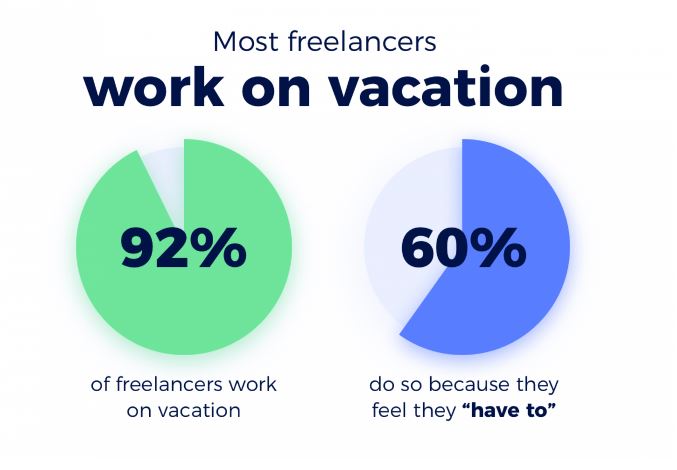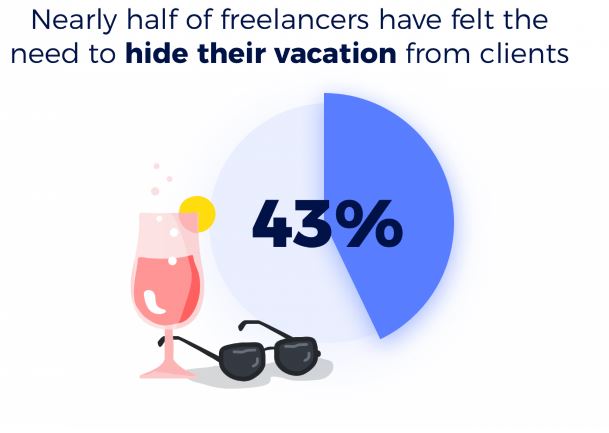
Need to Relax? Here’s How to Actually Take a Vacation as a Full-Time Freelancer
Work hard, play hard – but what’s all that hard work worth if there’s no play?
Every worker needs time off to recharge and destress and when you’re a full-time freelancer or small business owner, you might need more vacation than you thought. Unlike company employees, freelancers don’t benefit from the typical paid vacation leave as there’s nobody to pay you when you’re off but you.
Taking time off is good for your business, your well-being and ultimately boosts productivity.
The Freelancer’s Dilemma
Today, specifically in the US, about 57 million workers have decided to ditch the 9-to-5 life to pursue their passion and work from anywhere in the world, but that doesn’t mean that it has to come at the expense of time off.
Unfortunately, a recent study by HoneyBook, a business and financial management platform for entrepreneurs and freelancers found that 92% of freelancers feel they must work while on vacation. In fact, the study also found that nearly 43% of freelancers have felt the need to hide their vacations from their clients.


Source: Honeybook.com


Source: Honeybook.com
Unplugging continues to be a common challenge for many professionals, but with careful planning, you’ll be able to take all the vacations you want without hurting your income. Freelancers and entrepreneurs should enjoy a well-deserved vacation.
Here are 7 surefire ways to plan you next vacation…and feel good about it!
1. Tell Your Clients in Advance
No client of yours wants to be surprised with an out of office message while trying to contact you. Instead, give them a heads up and make sure to notify them that you’ll be taking time off and what they should expect from you while you’re away. Remember, no means no so if you’re really planning on disconnecting from your work completely then make sure to emphasize that you will not be available, unless there’s an urgent matter in which you can offer a secondary contact.
2. Hire a Virtual Assistant
More and more small business owners are relying on virtual employee assistants to help them manage their day-to-day operations. As a freelancer that’s planning an ideal vacation, delegating more of your administrative tasks to someone else can offer you some relief and peace of mind, especially right before you set off for your trip. Train and guide them properly before you go and they can help you with personalized responses to emails, answering your office phone (if you have one) or dealing with inquiries on social media.
In addition, virtual assistants typically are not very expensive, so even if it’s just for while you’re away, it can be well worth it.
3. Set a Budget
One of the biggest challenges of working in the gig economy is the lack of paid time off. While planning your vacation, it’s highly recommended to make a budget so that your salary doesn’t feel the cut. This way you’ll know exactly how much you’ll spend on your vacation and you won’t have any surprises.
If you’ve planned your vacation well ahead of time, then you’ll have more time to save and ultimately, more to splurge! Planning in advance gives you the chance to set aside a small amount of your income each month towards your trip.
4. Keep Your Social Media Presence Alive
Just because you’re taking some time off doesn’t mean you need to fall off the planet. Be sure to schedule your content in advance and promote your services while you’re out of office. Keep your social media profiles alive with tools like Buffer or CoSchedule.
For example, if you’re a content creator then you can preschedule your blog posts and social media posts for while you’re away. Afterwards, set up an autoresponder for emails and subscribers.
5. Back up All Your Work
Before you take off, back up everything and we mean EVERYTHING. Don’t put yourself in a position where you come back from the most amazing vacation and find that certain projects of yours weren’t saved. From your laptop to your mobile phone, make sure you have copies of all your work on another hard drive or store all of your work under an app, that way everything remains safe while you’re gone.
6. Double up on Extra Work Before You Go
You’re super thrilled about finally going on that dream vacation, but at the same time, you might be stressed thinking about all the expenses you’ll have. Try grabbing a few extra side projects to boost your income. Check with your current clients if they need additional help or turn to short-term gigs on freelance marketplaces.
Perhaps you have teaching skills? If you can’t find any quick side gigs through your clients or marketplaces, try teaching online. Chances are that someone out there needs your tutoring services, whether it be a specific language or subject. Putting in the extra work before going away won’t make you regret any of your splurges.
7. Recognize That You Deserve a Vacation
Yes, you’re self-employed and yes you have bills to pay, but you need to come to terms with the fact that you do deserve time off to enjoy life, just like everyone else. Time off provides a number of health and productivity benefits. Booking a vacation is part of self-care and it’s important to remember that self-care is not a luxury but a necessity to keep you and your business going full force.
Compared to your peers who work under more traditional employment, as a freelancer, you certainly have more freedom and flexibility to choose your leisure time. Our best advice? Don’t be too hard on yourself and give yourself a break.
Plan ahead, stay organized, communicate clearly with your clients and go. You’ve earned it.
Bon Voyage!




